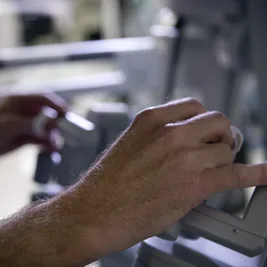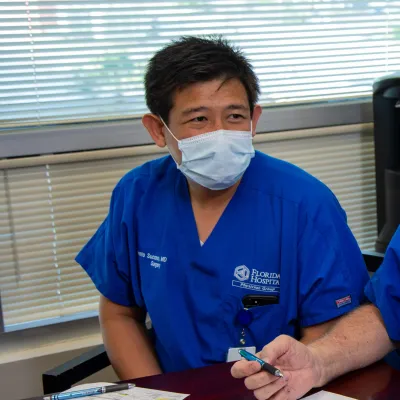
The High Level of Care Needed for Treating Gallbladder Cancer
Removing the gallbladder with cancer is a very complex surgery that requires a highly experienced surgeon like the ones at the AdventHealth Digestive Institute. Gallbladder cancer is a rare cancer that starts in the gallbladder, a small pear-shaped sac that stores bile produced by the liver until it is needed for digestion. About 9 out of 10 gallbladder cancers are adenocarcinomas, which involve glandular cells. The most common risk factors for gallbladder cancer is the presence of gallstones and a condition called porcelain gallbladder in which the calcium deposits line the gallbladder as a result of inflammation.
Gallbladder Cancer Symptoms
The symptoms of gallbladder cancer are very similar to those of other digestive cancers and conditions. Because gallbladder cancer is so rare, it is more likely that symptoms are related to another gallbladder condition or even a disorder of the liver.
It is important to see your doctor if you experience any of the following symptoms, which could signal gallbladder cancer:
- Abdominal pain, often in the upper right portion of the belly for patients with gallbladder cancer
- A lump in the right side of the belly caused by an enlarged gallbladder
- Vomiting or nausea
- Jaundice, or yellowing of the skin and eyes
Less common symptoms include:
- Dark urine
- Light-colored stools
- Itchiness
- Fever
- Abdominal swelling
- Loss of appetite
- Unintended weight loss
Diagnosis of Gallbladder Cancer
If your doctor believes you could have gallbladder cancer, you will most likely have the following tests:
- Blood testing to see if there might be a problem with your gallbladder or liver
- Imaging tests that could include ultrasound, CT scan, MRI scan or a combination of these
If your imaging tests show a gallbladder tumor, one of two situations will be likely:
- If the suspicious tumor is confined to the gallbladder, your doctor may want to treat it as if it were cancer. If so, you will have a cholecystectomy to remove the gallbladder without first obtaining a biopsy. This is because collecting tumor cells for biopsy could cause tumor cells to break off from your gallbladder and travel to other parts of your body. The minor inconvenience of living without a gallbladder, as many people do, is worth not risking the spread of cancer.
- If the suspicious area is large or has moved outside of the gallbladder, it is likely that surgery will not be able to remove the tumor completely. In this case, often an endoscopic retrograde cholangiopancreatography (ERCP) is used along with fine needle aspiration to image the gallbladder and remove small tissue samples of suspicious areas and collect some of the bile. A pathologist will study these samples under a microscope to see if they are cancerous.
Minimally Invasive Exploratory Surgery
Sometimes a minimally invasive laparoscopic procedure will be done to stage gallbladder cancer. This procedure checks to see where the tumor has spread and if it can be completely removed. This procedure will help a surgeon plan a patient’s treatment.
Discovery of Cancer During a Cholecystectomy
Occasionally, gallbladder cancer is caught during a cholecystectomy – a routine, usually minimally invasive, surgery to remove the gallbladder. If this is the case, the surgeon will convert the surgery to an open one to make sure all of the tumor is removed. The surgeon can also see if cancer has spread and prevent cancer cells from breaking off from the gallbladder and traveling to other parts of the body.
Surgery to Treat Gallbladder Cancer at AdventHealth
Surgery to remove gallbladder cancer is the best chance for cure. If gallbladder cancer is resectable, it means that it is able to be removed by surgery. Because gallbladder cancer is most often caught in its later stages, only some gallbladder tumors can be removed as the first course of treatment.
Gallbladder resection as a way to treat gallbladder cancer is a very complex surgery that requires a highly experienced surgeon. Some surgeons are comfortable with removing only very small tumors. If you have been told that your gallbladder cancer is unresectable (unable to be removed), consider getting a second opinion. AdventHealth Digestive Institute surgeons may be able to completely remove larger and more advanced gallbladder tumors.
Radical Cholecystectomy
While most people with gallbladder conditions need only their gallbladders removed (a simple cholecystectomy), patients with cancer require a more extensive operation. In addition to the gallbladder, all of the lymph nodes in the area will be removed as well as the part of the liver next to the gallbladder. For early-stage gallbladder cancer, our surgeons can perform a radical cholecystectomy as a minimally invasive surgery. This allows patients to have faster recoveries and move on to their next treatment stage sooner.
Depending on how far the cancer has spread, additional organs and ducts may need to be removed as well. In this case, an open radical cholecystectomy procedure may need to be done to account for the complexity of the surgery.
Palliative Surgery
Sometimes surgery is offered as a treatment that can reduce patients’ pain or to make sure their bile ducts stay unblocked. In this case, it is known as palliative surgery. Although palliative surgery will not cure the condition, it can help prolong patients’ lives and make them more comfortable.
Surgical Cancer Care
-
Esophageal Cancer
Typically esophageal cancer requires surgery in addition to radiation and chemotherapy. Learn more about the surgical treatments our specialists can provide.
-
Gastric/Stomach Cancer
We help diagnose and treat stomach cancer. We even have minimally invasive options. Learn more about how our gastroenterologists can help you.
-
Duodenal/Small Bowel Cancer
Our gastroenterologists diagnose and treat small bowel and duodenal cancer. We offer three minimally invasive treatment options.
-
Pancreatic Cancer
Our surgeons are among the region’s most experienced in pancreatic surgery. We can help treat your cancer with minimally invasive options. Learn more today.
-
Liver Cancer
Our AdventHealth Digestive Institute surgeons offer surgical and non-surgical liver cancer treatments, depending on your specific case. Schedule an appointment with one of our gastroenterologists.
-
Gallbladder Cancer
Removing the gallbladder with cancer is a very complex surgery that requires highly experienced surgeons like those at AdventHealth Digestive Institute.
-
Colon and Rectal Cancer
Our experienced gastroenterologists can diagnose and treat colon and rectal cancer. Learn more about treatment and surgery options.
-
Anal Cancer
Our colon and rectal surgeons can help diagnose and treat anal cancer. We offer anal cancer surgery when necessary.
-
Public Reporting of Outcomes
Our compassionate medical staff is committed to providing high-quality healthcare services in Hillsborough County.

Recover Faster With Minimally Invasive and Robotic Surgery
All the surgeons at the Digestive Health Institute (DHI) have a large depth of experience in offering minimally invasive surgery.
Meet The Experts

Sharona Ross, MD
General Surgery

Iswanto Sucandy, MD
General Surgery

Surgical Consultations For Digestive Cancer Without The Wait
Appointments Within Five Days for Patients with Cancer
At AdventHealth Digestive Institute, we know that after being diagnosed with cancer, patients want and often need to begin treatment quickly. So we make it a priority to offer appointments for cancer surgery consultations within five business days, and often earlier.
Patients who are newly diagnosed with cancer, or have just found out they have cancer again, qualify for this priority access. Our surgeons will make themselves available to see you right away, even for a second opinion. We want to help you start your treatment as soon as possible.
News and Info
-

-

-

-
 Blogs
BlogsDigestive Institute Tampa Surgeon Appointed to Advisory Board of Robotic Surgeons
Estimated read time: -
 Blogs
BlogsSafeguard Your Colon Health: Get The Facts about colorectal cancer screening tests
Estimated read time: -

